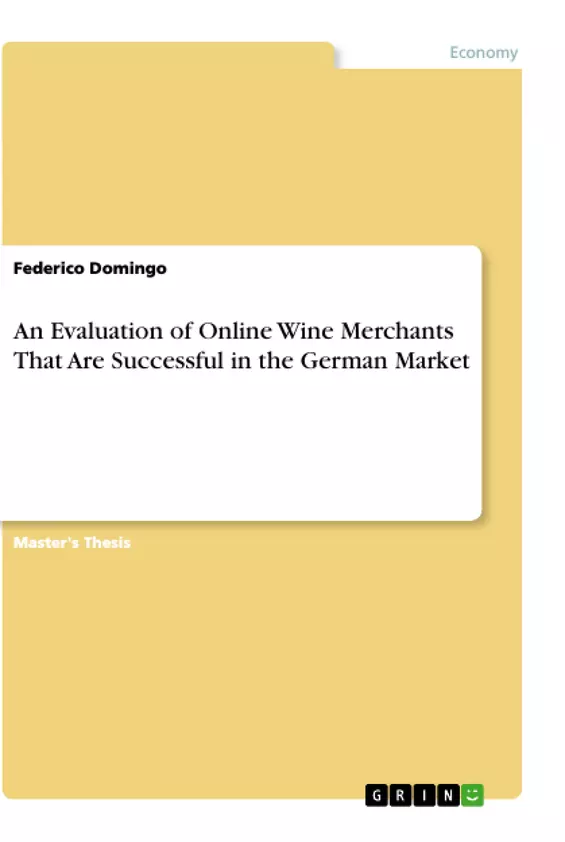The objective of this paper is to identify which elements make online wine merchants successful in the German market. The identified factors will give guidance to companies to take managerial actions to improve their business model and marketing investment actions.
The qualitative method used to identify elements that contribute to the success of online wine merchants was a semi-structured interview, which gathered insights from companies of the industry. Moreover, secondary sources were used to make an evaluation and to link with the results from the interviews. The findings obtained from the interviews show that the term success relates to having customers returning to the store. Moreover, other factors such as pricing, product accessibility, product information asymmetry, customer support, trust, and shipping times play a critical role in the customers purchasing decision.
The conclusions of this paper sustain that online wine merchants should follow a multi-channel selling strategy. Moreover, it is essential to provide excellent customer service that generates trust. Also, customers feedback plays a vital role for companies to help improve processes as the need to create a positive word of mouth between wine consumers is critical nowadays.
Table of Content
- INTRODUCTION
- RESEARCH QUESTION AND OBJECTIVE
- STRUCTURE OF THE THESIS
- LITERATURE REVIEW
- DEFINITION OF SUCCESS
- MILLENNIAL GENERATIONS
- CONSUMPTION BEHAVIORS
- COMPETITIVE ANALYSIS MODELS
- COMPETITIVE ANALYSIS OF THE GERMAN WINE MARKET
- ENTRY BARRIERS
- DETERMINANTS OF SUPPLIER POWER
- DETERMINANTS OF SUBSTITUTION THREAT
- DETERMINANTS OF BUYER POWER
- Consumption Behaviors
- RIVALRY DETERMINANTS
- COMPETITIVE SUMMARY
- WINE E-COMMERCE
- FRAMEWORK
- CHALLENGES
- Product and website related challenges
- Financial and time uncertainty
- Privacy Policies
- Information asymmetry
- MARKET TRENDS
- ONLINE SELLING STRATEGIES (BEST PRACTICES)
- METHODOLOGY
- DISCUSSION OF QUANTITATIVE AND QUALITATIVE METHODS
- VERIFICATION OF THE METHOD
- CONDUCTING THE INTERVIEWS
- INTERVIEW DATA ANALYSIS
- Interview characteristics
- Definition of Success
- German Wine Market
- Online Shops
- Trends
- Best Practices
- CONCLUSIONS
- CRITICAL REVIEW
- EVALUATION AND MANAGERIAL IMPLICATIONS
- LIMITATIONS AND FURTHER RESEARCH POSSIBILITIES
Objectives and Key Themes
This dissertation examines the success of online wine merchants in the German market. It aims to identify the key factors contributing to their success and provide insights into the challenges and opportunities they face. This research utilizes a combination of quantitative and qualitative methods to analyze the German wine market, consumer behaviors, and best practices for online wine retailers.
- Defining success in the context of online wine merchants
- Analyzing the German wine market and its competitive landscape
- Exploring consumer behaviors and the role of millennial generations
- Identifying challenges and opportunities for online wine merchants
- Analyzing successful online selling strategies and best practices
Chapter Summaries
- Introduction: This chapter outlines the research question, the objectives of the dissertation, and the structure of the thesis. It provides a brief overview of the topic and its relevance.
- Literature Review: This chapter presents a review of relevant literature on the definition of success, millennial generations, consumer behaviors, and competitive analysis models. It provides a theoretical framework for the research.
- Competitive Analysis of the German Wine Market: This chapter analyzes the competitive landscape of the German wine market using Porter's Five Forces model. It examines entry barriers, supplier power, substitution threat, buyer power, and rivalry determinants.
- Wine E-Commerce: This chapter focuses on the specific challenges and opportunities of wine e-commerce. It discusses product and website-related challenges, financial and time uncertainty, privacy policies, information asymmetry, market trends, and successful online selling strategies.
- Methodology: This chapter details the research methodology used, including the combination of quantitative and qualitative methods. It explains the data collection and analysis procedures, particularly focusing on the interview process and data analysis methods.
Keywords
The main keywords and focus topics of this dissertation include online wine merchants, German wine market, competitive analysis, consumer behavior, millennial generations, e-commerce, online selling strategies, best practices, success factors, challenges, and opportunities.
Frequently Asked Questions
What defines success for online wine merchants in Germany?
Success is primarily defined as achieving high customer retention and having customers return to the store for repeat purchases.
What are the key factors influencing a customer's decision to buy wine online?
Critical factors include pricing, product accessibility, detailed product information, customer support, trust, and fast shipping times.
What selling strategy is recommended for wine retailers?
The research suggests a multi-channel selling strategy to reach consumers effectively across different platforms and touchpoints.
How do Millennial consumption behaviors impact the German wine market?
The study analyzes Millennial behaviors to help merchants adapt their business models to the specific preferences and digital habits of this generation.
What are the main challenges faced by wine e-commerce businesses?
Merchants face challenges related to information asymmetry, financial uncertainty, privacy policies, and the technical aspects of website management.
How was the data for this research collected?
The researcher used a qualitative method involving semi-structured interviews with industry companies, supplemented by secondary sources.
- Citar trabajo
- Federico Domingo (Autor), 2019, An Evaluation of Online Wine Merchants That Are Successful in the German Market, Múnich, GRIN Verlag, https://www.grin.com/document/504609



